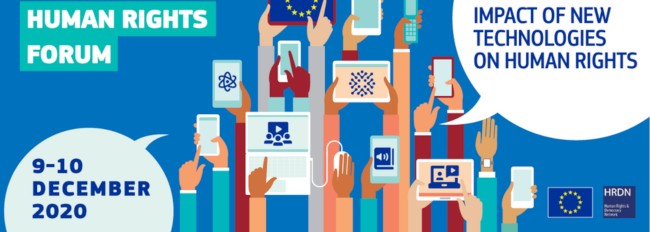

FIDH – 22 January 2021 – Each year, the European Union and civil society jointly organise a forum on human rights around the world. FIDH, as one of the organisers of the 2020 edition, welcomes the 22nd annual forum’s exploration of one of the greatest challenges of our times: ensuring that technological governance be grounded in human rights.
FIDH believes that human rights must become a central priority in the debate on new technologies. The stakes are high. Digital technology, new technologies, and artificial intelligence are now inextricably bound up with our lives – in the form of communication tools, as well as tools of economic, climatic or medical rationalisation. By rushing into globalised competition without first thinking to the rationale, we render our future all the more uncertain. Yet human rights are not yet properly included in considerations and discussions on use of these new technologies.
FIDH President Alice Mogwe opened the event alongside Michelle Bachelet, the United Nations High Commissioner for Human Rights, and Eamon Gilmore, the European Union Special Representative for Human Rights.
Ms Mogwe emphasised the urgency to address this issue using a human rights approach. Technological appropriation—in a context of the growing influence of illiberal regimes and unregulated business activities, general lack of knowledge and awareness, and inadequacy of existing frameworks— collectively serves as a warning about the risks to human rights, to access for all to common goods and to the preservation of our self-determination. Drawing on the experiences of human rights defenders around the world, Ms Mogwe questioned the way in which technological issues and their impact are approached—from smart cities and control of the internet to surveillance and the manipulation of information.
Sharon Hom, Director of Human Rights in China, a member organisation of FIDH, introduced the terms of the debate alongside Heidi Hautala (Vice President of the European Parliament), Giuseppe Abbamonte (Director at the European Commission, DG connect), Michael O’Flaherty (Director at the European Union Agency for Fundamental Rights), Marie Arena, (Chair of the European Parliament’s Subcommittee on Human Rights) and Eliska Pirkova (analyst for Access Now).
Ms Hom contrasted the speed at which algorithmic control of our lives could emerge to the slowness of our adaptation processes. A China specialist, she considers the Beijing regime a textbook case of the authoritarian potential of new technologies, while recalling that the Chinese authorities intend to export their model and position themselves as world leaders. The issue lies not only in the risk of seeing the technologies hijacked by harmful regimes or individuals, but also in the business model that governs their development. Ms Hom brilliantly examined the means available to ensure a more human-centric technology, developed according to the needs for dignity, autonomy and informed choices. (See “Between a Rock and a Hard Place: Human Rights Defenders in China,” an expanded text version of Ms. Hom’s remarks.)
Finally, Penelope Faulkner, Vice President of Vietnam Committee on Human Rights (VCHR), a member organisation of FIDH, spoke about the obligations of States and the private sector in terms of technological governance.
With her expertise on Vietnam, Ms Faulkner pointed out Facebook’s involvement in the repressive policies of the regime in power. More broadly, she documented the inconsistency of governments the world over, which not only engage in trade practices that do not respect human rights, but instead engage in what could be described as ‘technological sub-contracting’ in defence of democracy. It is indeed inconsistent to rely on the goodwill of technological giants. National legislative frameworks are insufficient, and the concepts of ethics and security remain ambiguous. It is necessary to strengthen the international human rights framework and ensure its effectiveness.
This post is also available in:
 Quê Me Quê Me: Action for democracy in Vietnam & Vietnam Committee on Human Rights
Quê Me Quê Me: Action for democracy in Vietnam & Vietnam Committee on Human Rights


